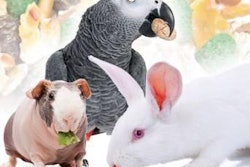The Department of Animal Sciences at the University of Illinois in Urbana, Illinois, USA, has one of the world's leading--and very few--programs devoted to studying and researching companion animal nutrition. Its faculty and students are involved in much of the research that is published in top scientific journals on animal nutrition and that leads to breakthroughs in understanding pet nutrition and developing new ingredients and products for our industry.
So, when one of the department's faculty gets behind a project, you know it's probably worth the industry's support. The latest effort is a potentially exciting endeavor with a rather prosaic name: the American Gut Project. (Reading about it so soon after the US Thanksgiving holiday, I can't help but picture how our physiques looked after stuffing ourselves at our respective holiday feasts.)
Despite the name, what I find particularly exciting about this project is its study of the gastrointestinal microbiomes of both humans and animals. (OK, "gut" has a much better ring to it than does "gastrointestinal.") More and more, scientists and researchers are seeing how health conditions and diseases in one species might shed light on the same conditions in another, including humans. For example, a research initiative organized by the National Cancer Institute has several universities (including the University of Illinois and its nutritional pharmacology program for humans) studying dogs as a comparative model for tumors in humans, and vice versa. The research is looking at the role of nutrition, among other factors, in preventing cancer.
Kelly Swanson, PhD, associate professor of the Department of Animal Sciences and Division of Nutritional Sciences at the University of Illinois, explains that the main concept behind the American Gut Project is to take the research out of the lab and into the real world, where humans and animals actually live, eat and are influenced by their environments. "Our current knowledge of the dog and cat gut microbiome is based primarily on a handful of studies in research labs or of clinically ill patients," he says. "The American Gut Project will apply the existing genomic technology to free-living pets, where diet, genetics and living environment are quite different from household to household. Such a study may identify important trends that are not possible with small studies."
One of Swanson's many roles is to oversee the university's companion animal nutrition lab, originally started by George Fahey, PhD, professor emeritus and well-known in the petfood industry. "Much of my lab’s research is focused on the dog and cat gastrointestinal microbiome, how it is impacted by diet and how it relates to host health," Swanson says. That's one of the reasons why he is a collaborator in the American Gut Project and is turning to our industry for support. "If enough support is generated (it is a crowd-funded project) and samples are received, this will be a highly valuable dataset for the pet health research community." And, by extension, the petfood industry.
Swanson points out that in addition to contributing to the study as a whole, participants can learn how their own microbiome and their pets’ microbiome compare to others in the project. "Plus, given its funding source, all data will be open source and readily available to the entire research community!"
So it might be fun to participate in the project just to find out more about your own GI health or that of your pet. But know that you'll be contributing to the ongoing study and development of pet nutrition knowledge, too. That reason alone might also be cause for you to consider asking your company to provide funding to further support the project.

















